Funds Set Up in Major Financial Hubs in the Middle East
DISCLAIMER: This post was last modified on 8 February 2024. Some information in this article may not be updated.
Despite the instability in the global economy, the Middle East market continues to thrive. Foreign investors are finding the region more appealing as a result of the governments’ significant investments in infrastructure, digitalisation and ongoing economic diversification.
With the efforts of the Gulf Cooperation Council (“GCC”) to enhance their infrastructure and adhere to international standards, the interest of foreign investors in the Middle East is on the rise.
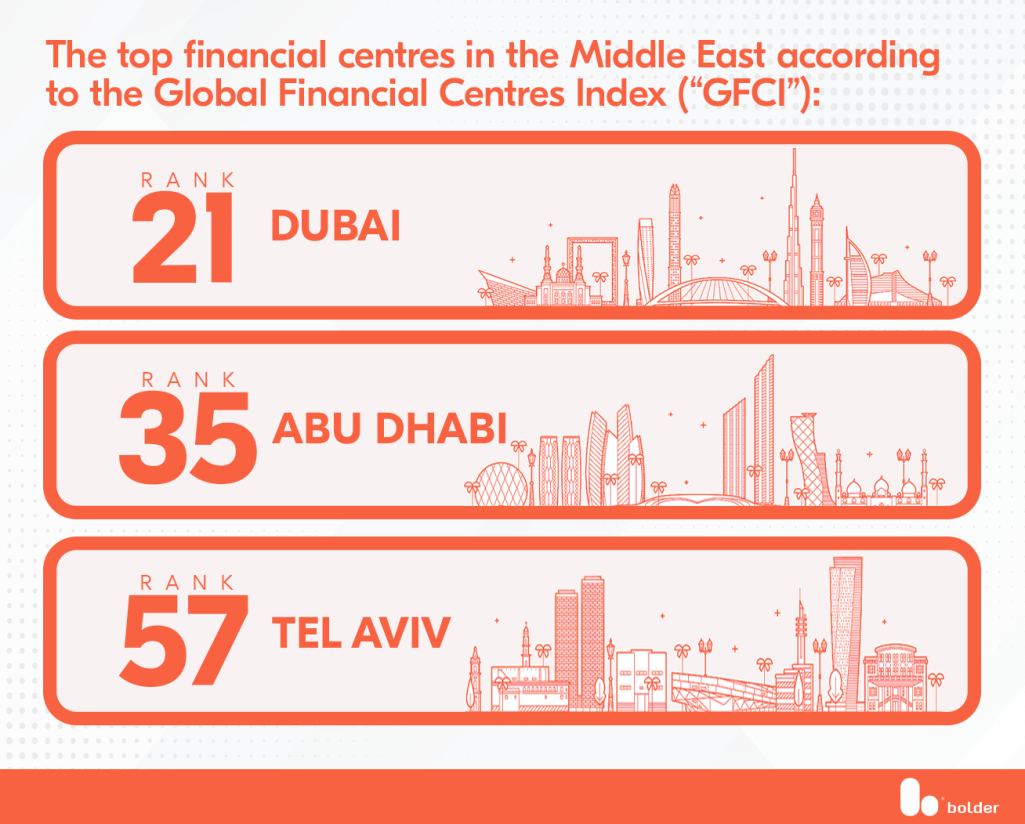
With a score of 721 on the GFCI, Dubai ranked as the most attractive financial hub in the Middle East and North Africa (“MENA”) in 2020.
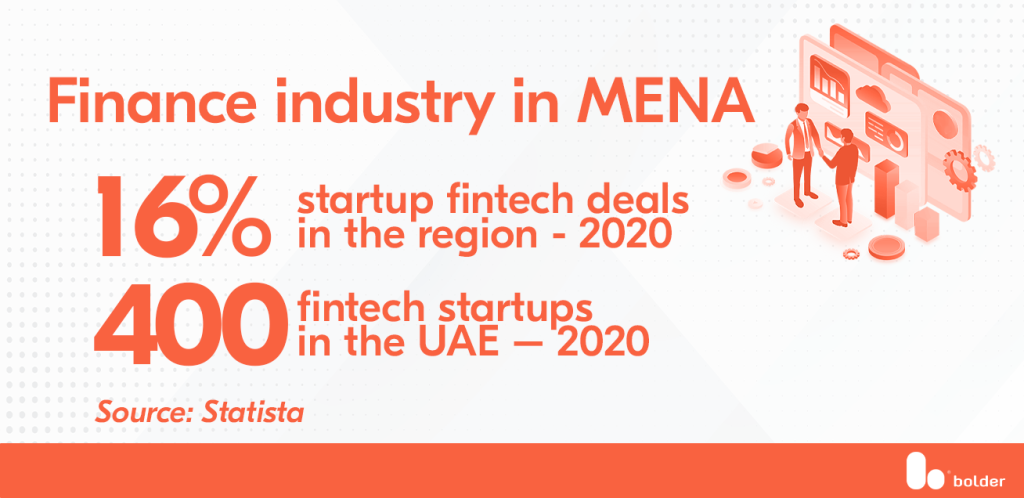
A strategic geographical location and vast resources accessible for investment in various industries present an opportunity for the Middle East to become a more significant financial hub. With the income generated by oil production, the region has the financial resources to invest in various financial sectors, such as asset management and investment services.
Leading financial hubs in the Middle East
Developments in the capital market, the expansion of emerging markets and improvements in banking and financial markets are the key trends shaping the Middle East’s funds outlook.
Below are the leading financial hubs in the region with an overview of the funds landscape of each respective jurisdiction:
Dubai, United Arab Emirates
Known for its thriving economy and strategic value, Dubai continues to strengthen its position as an influential global business, financial and industrial hub. The establishment of significant number of global hedge funds in the city is contributing to its popularity.
With the establishment of well-known global hedge funds in 2004, the Dubai International Financial Centre (“DIFC”), a significant financial hub that has served the Middle East, Africa and South Asia since its founding, secures Dubai’s position in the global financial landscape.
Benefits of setting up funds in Dubai
- Robust web infrastructure for portfolio management and investor relations
- Favourable tax environment
- Thriving local trade markets
- Dynamic business culture
Process and requirements to set up funds in Dubai
The Collective Investment Fund Regime governs the establishment of funds in the Dubai International Financial Centre. See the general process and requirements in setting up a fund in Dubai below:
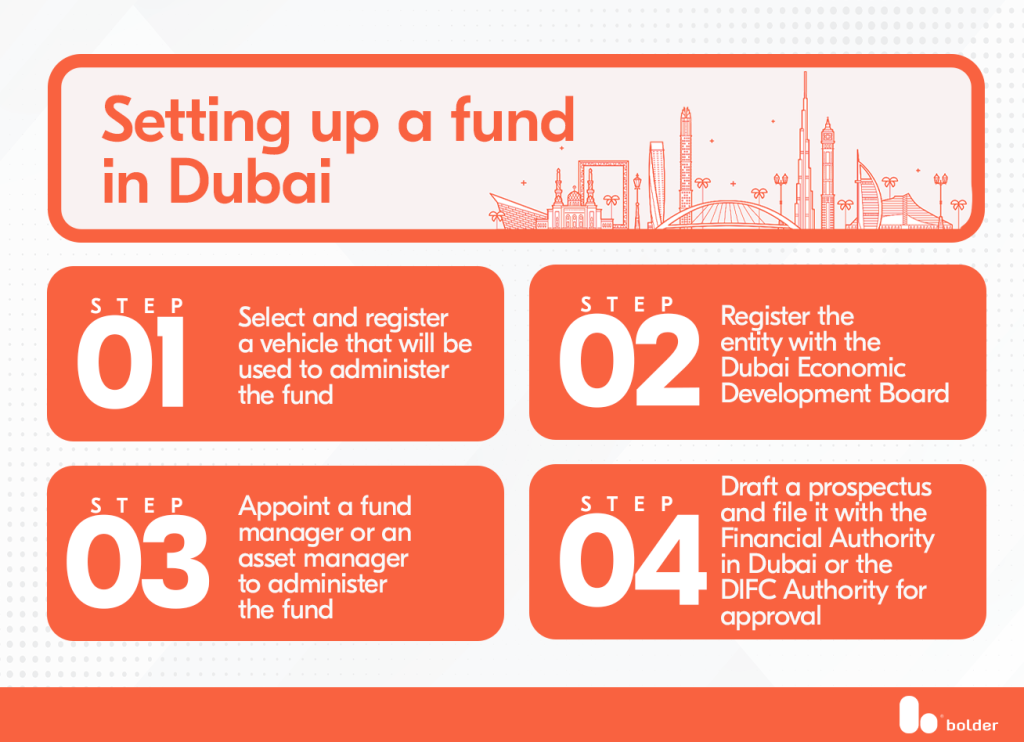
The following requirements are necessary to set up a fund:
- Fund manager or asset manager;
- Prospectus;
- A minimum amount of 1 million USD to set up a qualified investment fund; and
- At least 50 qualified investors.
Qatar
Investment funds in Qatar had assets under management (“AUM”) worth US$19.6 billion in 2019, mostly under the management of investment managers based in the Qatar Financial Centre (“QFC”).
After QFC’s exchange-traded funds (“ETFs”) regime was established, Amwal, Qatar’s first regulated Investment Company, and Doha Bank partnered to introduce the QE Index ETF (“QETF QD”). This was Qatar’s first ETF, an equity fund that tracks the biggest and most liquid companies listed on the Qatar Stock Exchange (“QSE”).
Additionally, the Qatar Financial Centre Regulatory Authority (“QFCRA”) amended its CIS rulebook to permit retail real estate funds, such as real estate investment trusts (“REITS”). This allowed sponsors and investors to take part in the massive infrastructure projects in Qatar by establishing and investing in infrastructure funds.
Benefits of setting up a firm in Qatar
- Strategic location
- Stable economy and business-friendly environment
- Accessibility to international markets
- Tax advantages
- Excellent infrastructure
Process of establishing a QFC Investment Management and Advisory (“INMA”) Firm: How to apply for QFCRA authorisation?
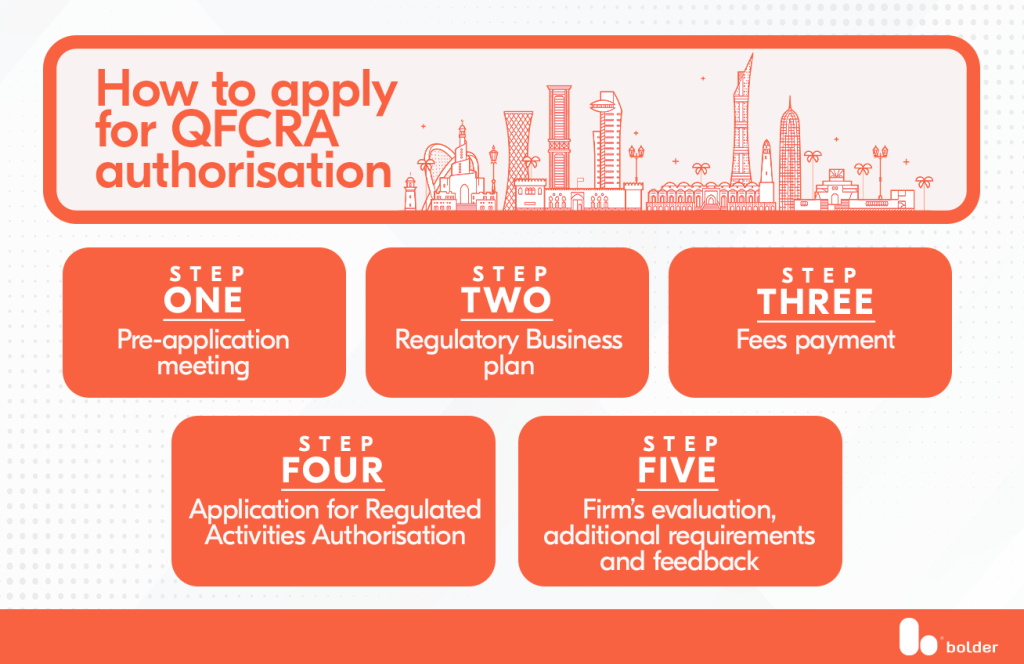
Requirements for the Collective Investment Scheme (“CIS”) registration application
| Type of information | Area | Detailed requirement |
|---|---|---|
| Fund information | Collective Investment Scheme | – Proposed name – Legal structure & details of registered address, directors, etc. – Details of investment objectives and policies (for each sub-fund in case of umbrella schemes) – Details on the fund structure (where applicable): share classes, initial offer, duration, outsourcing, distribution policy, currency, etc. – Details of auditor and applicable accounting standards – Incorporation documents – Prospectus – Constitutional document |
Abu Dhabi, United Arab Emirates
Abu Dhabi, the United Arab Emirates’ capital city, is also considered a powerhouse for investments in the MENA region, accounting for 31 per cent of the total foreign direct investment inflows in 2021.
The capital city aims to augment its non-oil sectors further, providing sustainable investment avenues and capital flow to growing sectors such as industrial, financial and insurance sectors.
The Abu Dhabi Global Market (“ADGM”), established in October 2015, is an international financial centre, a financial free zone and an independent jurisdiction within Abu Dhabi’s Al Maryah Island. Its fund framework is designed to facilitate wide-ranging fund management activities, fund types and fund vehicles for fund managers.
Benefits of setting up funds in Abu Dhabi
- Stable and robust economy
- World-class fund infrastructure
- Favourable tax regime
- Government support and incentives
General process and requirements in the fund setup
Below are some of the general processes and requirements for setting up funds in the ADGM.
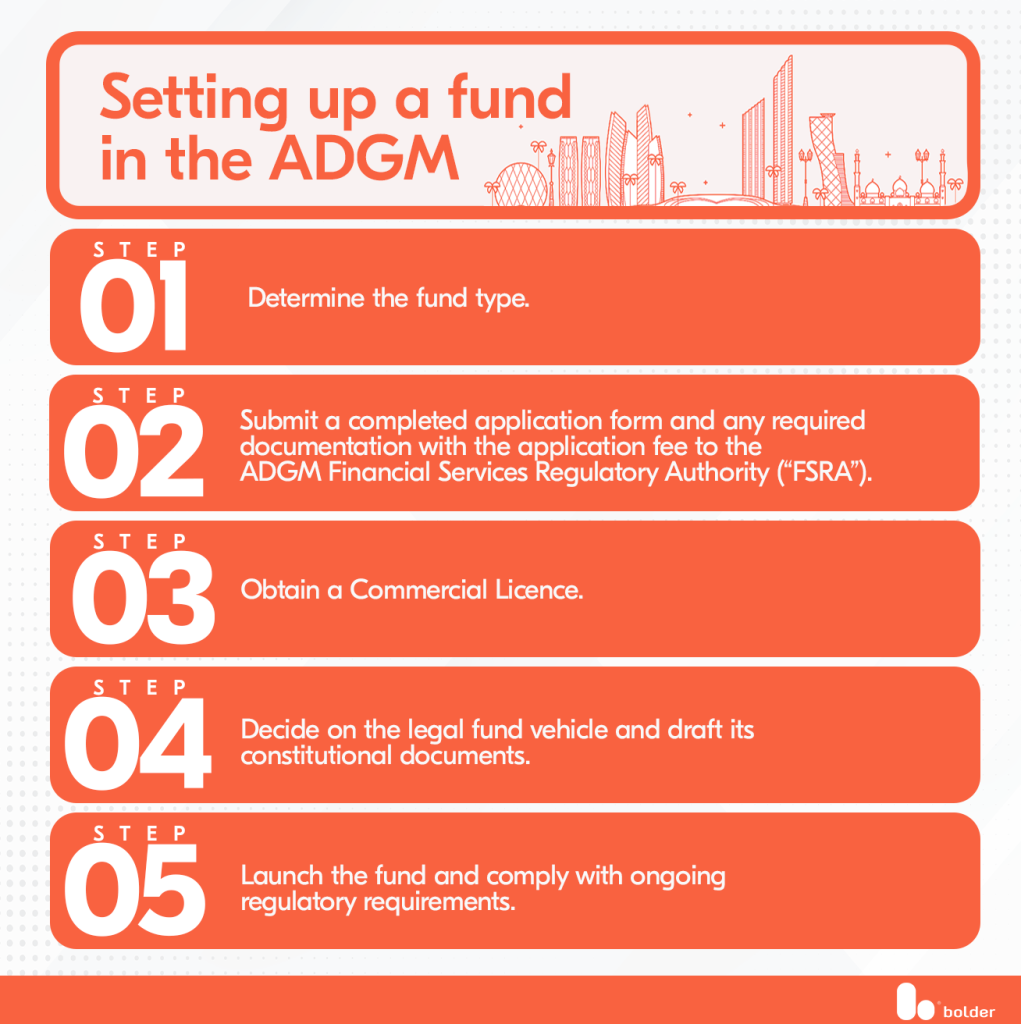
The requirements for setting up a fund in the ADGM would vary depending on the chosen fund structure. In general, the requirements include:
- Private Placement Memorandum (“PPM”);
- Subscription Agreement (for investors);
- Limited Partnership Agreement (only applicable to funds structured through partnerships);
- Investment Management Agreement; and
- Fund Constitution (only applicable to investment companies).
Riyadh, Kingdom of Saudi Arabia
Riyadh is the Kingdom of Saudi Arabia’s (“KSA’s”) capital and financial centre. It boasts diversified sectors that contribute approximately 50 percent to the Kingdom’s non-oil GDP and provide rich regional investment opportunities.
In addition, the Saudi Arabian government further welcomes investment in the capital with the rollout of its large-scale “giga projects”, which are essential in its “Vision 2030” socio-economic reform programme.
The Kingdom’s assets under management are valued at SAR 790.16 billion (approximately US$210.7 billion) in the third quarter of 2023, signifying a 3.86 per cent increase compared to the same period in 2022.
Benefits of setting up funds in Riyadh
- Abundant financing schemes
- Attractive tax incentives
- Streamlined setup process
- Diverse investment opportunities in various sectors
General process and requirements in the setup of funds in the KSA
There are numerous investment vehicles available for setting up funds in the KSA, some of which are limited liability companies (“LLCs”), joint stock companies (“JSCs”) and simplified JSCs, among others.
The establishment of an investment fund in the KSA is regulated by the Kingdom’s Capital Market Authority (“CMA”) through the Investment Fund Regulations (“IFRs”).
Below are the general procedures for setting up funds in KSA.

On the other hand, some of the requirements to set up a fund in the KSA are as follows:
- Offering documents (e.g., fund terms and conditions);
- Business profile and business plan;
- Fund vehicle organisational structure and terms of business;
- Copy of articles of association; and
- Compliance monitoring programme, to name a few.
Cairo, Egypt
Egypt’s investment funds market has seen significant growth in recent years, especially in the FinTech industry. According to FinTech Egypt’s 2023 Fintech Landscape Report, the Egyptian startup ecosystem acquired private equity investments of US$437.7 million and US$358.8 million worth of venture capital investments.
Cairo is one of the major economic centres in Egypt, presenting various business and investment opportunities in sectors such as real estate and infrastructure.
Benefits of setting up funds in Cairo
- Government support
- Accessible funding mechanisms
- Progressive regulatory reforms
- Strategic location and gateway to Arab and African investments
Requirements to set up funds in Egypt
The joint-stock company is one of the most widely utilised fund vehicles for fund managers in Egypt. However, other fund vehicles available are limited liability companies (“LLCs”) and limited partnerships.
Some of the requirements necessary to establish a fund in the form of a JSC are as follows:
- Articles of Association
- Draft prospectus memorandum;
- Management agreement between the bank and the fund manager;
- Bank deposit certificate;
- Auditor declaration form; and
- Statement containing the person in charge of finalising the application, among others.
Bolder presence in MENA
Bolder x Levari
In January 2024, Bolder Group announced its partnership with Levari Law, a leading law firm in the Middle East with offices in Cairo, Dubai, Riyadh and London. This partnership allows Bolder Group and Levari Law to provide a unique and comprehensive suite of corporate, funds and legal services to asset managers, investors, corporations and private individuals across the MENA region, APAC, Europe and the Americas.
Levari Law’s significant knowledge and experience in the region enables Bolder Group to provide legal support to clients in the Middle Eastern market, specifically in the areas of:
- Banking & Finance
- Commercial, Corporate and M&A
- Corporate Structuring & Offshoring
- Dispute Resolution
Read more about the partnership in this article.
Bolder Group’s global fund services
Bolder Group is a global fund administrator providing comprehensive fund administration services to asset managers, corporations, multinationals and high-net-worth individuals. We recognise the challenges associated with middle and back-office responsibilities in administering your funds.
Our fund administration solutions cover the following funds:
- Hedge Funds
- Fund of Funds
- Real Estate Funds
- Digital Assets
- Private Equity and Venture Capital Funds
- Managed Accounts
Structure your fund or investment vehicle with the assistance of global experts now. Contact your nearest Bolder office to kickstart the process.
Bolder Group does not provide financial, tax or legal advice and the information contained herein is meant for general information purposes only. We strongly recommend that before acting on any of the information contained herein, readers should consult with their professional advisers. The Bolder Group accepts no liability for any errors or omissions in the information, or the consequences resulting from any action taken by a reader based on the information provided herein.
Bolder Group refers to the global network of independent subsidiaries of Bolder Group Holding BV. Bolder Group Holding BV provides no client services. Such services are provided solely by the independent companies within the Bolder Group which are each legally distinct and separate entities and have no authority (actual, apparent, implied or otherwise) to obligate or bind Bolder Group Holding BV in any manner whatsoever. The operations of the Bolder Group are conducted independently and have no affiliation with third party financial, tax or legal advisory firms or corporations.
Featured Image from Envato.
